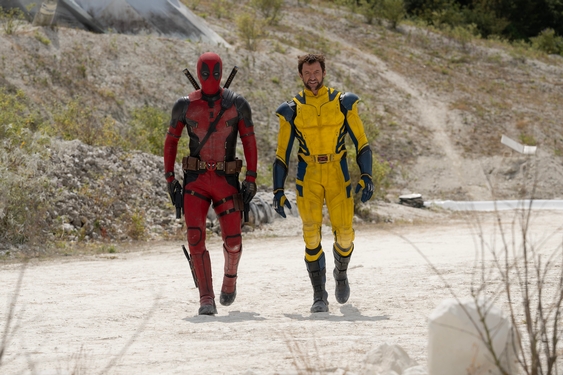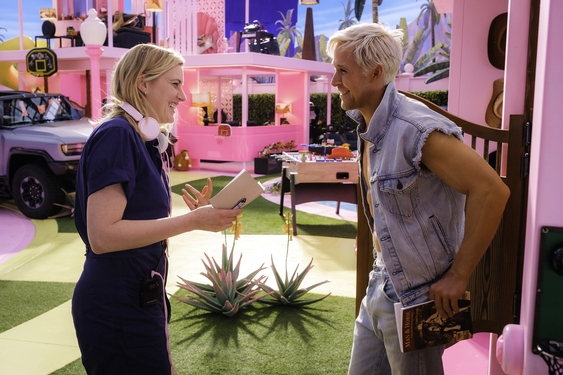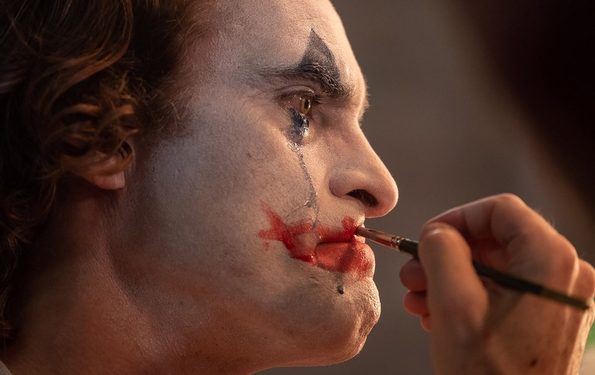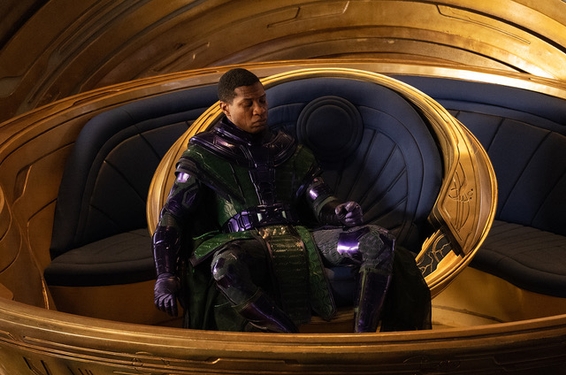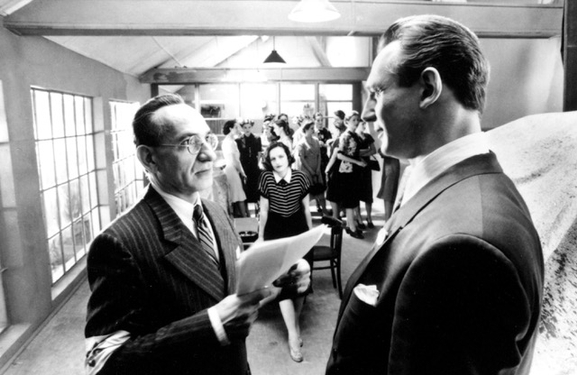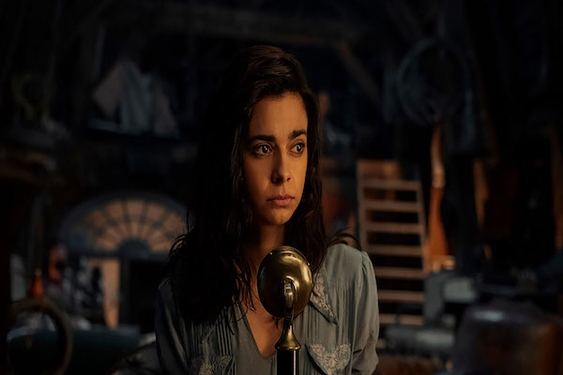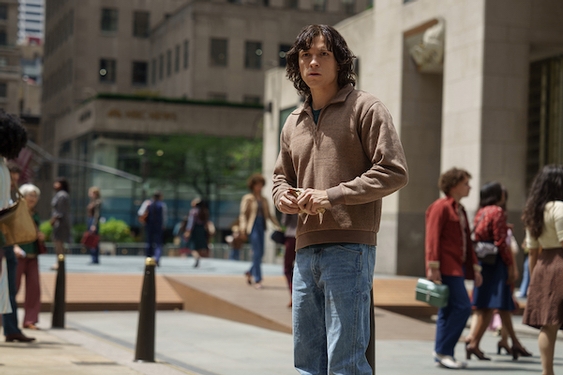There's a curious assertion on the IMDb trivia page for the 1994 movie "True Lies" that seemingly takes the action comedy's title to heart: " Jamie Lee Curtis performed the helicopter rescue scene herself," it reads. "At her insistence, director James Cameron agreed to let her perform this scary spectacle."
That might come as news to longtime stuntwoman Donna Keegan, who executed the stunt in question.
Keegan talks about that scene in the new documentary "Stuntwomen: The Untold Hollywood Story" and it's absolutely riveting to hear her describe her thought process as a clip from the movie plays. Curtis' character reaches up from the sunroof of a moving limousine to grab the hand of Arnold Schwarzenegger's character (a stuntman as well) who is hanging out of a helicopter.
Just before the car is about to careen off a bridge into the water, she's pulled out and we see her dangling by one hand as the helicopter soars up, up, up and off into the distance, with no land in sight. Keegan talks about it being an out-of-body experience.
That this incredible stunt is attributed to someone else on IMDb's trivia page is infuriating. Keegan and her fellow stuntwomen do extensive training — and put themselves at considerable bodily risk — to make TV and film. They are just as important to the process as the stars themselves.
Directed by Chicago native April Wright, "Stuntwomen: The Untold Hollywood Story" (which is available to stream on Amazon, GooglePlay and other PVOD platforms) captures not only the high-adrenaline side of the job, but also the behind-the-scenes logistics of pursuing this kind of career, as well as the biases that are still ongoing. The industry is "to this day, incredibly sexist and incredibly racist," at least one white guy admits in the film.
"The history is that women were doing stunts a hundred years ago at the beginning of cinema," said Wright. "And then when the studio system formed, a lot of men took over — not just stunts but also the key writing, directing and producing positions, many of which were held by women in the early days of cinema — so stunts become a heavily male-dominated industry and stayed that way for a while."
The sexist workaround is called "getting wigged," which is jargon for male stunt performers doubling for female stars, which has stymied women's careers.
"If a guy jumps in to do that more difficult stunt — difficult being a completely arbitrarily defined thing — then they get more credits on their resume and they also get that experience," Wright said. "So the next time a job comes around, even if it is to double a woman or a person of color, a coordinator will say, 'Who can pull off this stunt?' Well, the guy has more credits so he gets it, and he ends up racking up more credits and work experience, so when the next bigger stunt comes along, oh let's hire this guy because he has the experience."
Though Chicago has been home to a number of TV series in recent years, they don't necessarily provide enough regular work for stunt performers — especially Black stunt performers. April Sutton grew up in Chicago, originally in Calumet City and then Joliet. And until recently, she was locally based. She has a number of stunt credits on "Chicago P.D." (one of which required her to be tied up in a small crawl space) but she moved to Atlanta a few weeks ago, she said, "because there are just more opportunities for people of color and hopefully I'll get more work during the pandemic."
She got into stunt work initially when she was cast as an extra on "Divergent" in 2013. "We did a boot camp in preproduction and that entailed basic stunt fundamentals — tumbling, fight choreography, parkour, tactical training — and then also the conditioning part, because you have to be in great shape. I excelled in the fitness part and plus I was just really good at following directions; that made a good impression and eventually the stunt coordinator asked me if I wanted to do stunts for the film. And ever since then I've done stunt work."
When COVID-19 shut down nearly everything in the spring, Sutton was working in Michigan on a sports biopic called "Flint Strong" about the boxer Claressa Shields. "But the whole summer I didn't book any gigs because nothing was filming," she said. Not long after relocating to Atlanta last month, she was hired on the CW series "Black Lightning."
Like the practice of "getting wigged," there's another ugly workaround Hollywood has employed: The offensive and discriminatory practice of "painting down," which has white stunt performers donning blackface. This is what "Stargirl" actor Anjelika Washington experienced earlier in her career. Over the summer she posted a photo on Instagram of her standing next to her stunt double on an unnamed project.
"I was very uncomfortable (as anyone would be to meet your double in blackface) so I spoke up for myself," she wrote. "I pulled one of our producers aside and asked 'Why isn't my stunt double Black like me? Isn't that the point of a double?' She responded 'Sure. But we couldn't find a Black stunt double in L.A. Los Angeles doesn't have many Black stunt performers. But aren't you happy to be working? You should be thankful to be here.'"
Sutton said she's had equally uncomfortable moments. "Since I'm Black, my hair is thick. So I'm always having this fear of: I wonder what the hair department is going to say about my hair this time. I fear that kind of stuff more than the stunt itself. And that can cost you multiple jobs down the road, just because they were being (jerks)."
She's also seen white stunt performers post on Facebook, "Oh, it was so great doubling so-and-so" and she'll think, "Wait a second, you're white and the actress is Black; I actually could have doubled for her."
But pointing that out means "then I'm the bad guy and then I'll get blacklisted.
"It's already hard enough to get stunt work as a person of color. But when someone white is doubling for Black actors or Hispanic actors, I'm like, yo, I know several awesome stunt women who could have done the same great work. It's offensive because they didn't even try to look for a Black stunt performer."
Colorism can also be an issue: "I've doubled for people who are multiple shades darker than me — and I'm Black — I'm like, 'Hey, you guys could have found someone darker. You're putting me in a weird position.' Because stunt performers, we just want to be hired. And sometimes work is scarce. So we don't want to be in a position where we're held responsible for a situation unethical stunt coordinators put us in."
Stunt performers are represented by SAG-AFTRA (the same union as actors) and last month a number of stunt performers sent an open letter to the union pushing back on these discriminatory practices relating to gender and race. A complicating factor: Most stunt coordinators, who are also SAG-AFTRA members, control hiring and compensation. And they are primarily white and male. "So even though there are union minimums," said Wright, "there's what they call a bump or a discretionary amount for people who are doing the more difficult stunt who are paid more — and they're mostly giving the men the more difficult and higher paying stunts."
In the film, Wright talks to a number of veteran stuntwomen including Jeannie Epper, and we see footage of her shooting a scene from the Lynda Carter TV series "Wonder Woman" where she falls through a ceiling. "You OK, babe?" a crew member says when she gets up. Yes, she's OK. She'll go out drinking that night, as she often did after a day's work. Wright says that isn't as common anymore. "Most of the women in our film don't drink at all because their bodies are such a finely-tuned athletic machine. One thing I learned is that they basically said, 'Training is our 9 to 5. This is what we do everyday: We're practicing high falls or driving cars or yoga or sword training,' because they want to be sharp when that job comes up. And all that training is on their own dime."
Another stuntwoman featured is Julie Ann Johnson, who talks about a stunt going dangerously wrong on the set of "Charlie's Angels." She and another stuntwoman were riding in the back seat of a moving car and were tasked with opening the doors on each side and tumbling out. According to Johnson, the stunt driver had done a line of cocaine beforehand and instead of slowing down as practiced, he sped up.
"She basically got blackballed for bringing that up," Wright said. "She was kind of in the inner circle and once she spoke up about that she was very quickly out and it basically cost her her career." Drugs aren't as pervasive as they once were, Wright said. "I think it's more professionalized now, where stunt performers are almost looked at as professional athletes."
Funny thing about that: Athletes tend to have visible muscles. And yet there's so much pressure on female stars to be incredibly thin; imagine how that then trickles down to the stuntwomen who double for them. One stuntwoman in the film recalls being asked: "Can you drop 10 pounds?"
"Our film is trying to shine a light on all of this and show without a doubt that women and people of color stunt performers are capable," Wright said. "There's a concern of not wanting to bite the hand that feeds you. Everybody knows the cautionary tale of what happened to Julie Ann Johnson. So it can be difficult to speak up.
"But when you talk to them, they are people with fantastic focus and determination and they're not going to let anything stop them and I think you can feel that by the end of the film."
___
(c)2020 Chicago Tribune
Visit the Chicago Tribune at www.chicagotribune.com
Distributed by Tribune Content Agency, LLC.




